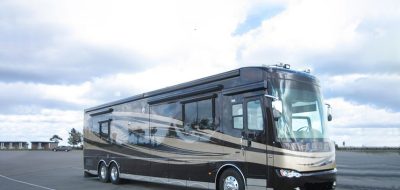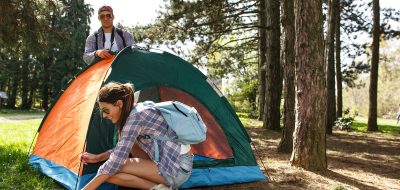Some of the most common RV problems stem from refrigerators. Refrigerators in RVs operate using an absorption system, which incorporates a completely different set of principles than those in compressor-driven household units.
The RV is far more demanding than the relatively static residential environment. For example, RV refrigerators are required to operate on a variety of energy sources and withstand all the jostling and vibration on highway travel. In order for these appliances to endure well, they must be given special care. However, even with the best of care, it is possible to suffer a variety of malfunctions.
There are many simple tricks to help an RV refrigerator deliver better service:
- Pre-cool the refrigerator by starting it the night before a camping trip. This should be done with no food in the refrigerator. Wait until the refrigerator is thoroughly cold before placing food inside.
- Pre-cool food in your home refrigerator and freezer. This gives the unit a break by adding cool items to it, rather than adding heat and demanding more work to cool it down.
- Proper refrigeration requires free air circulation within the food storage compartment. Restricted air circulation within the compartment will cause higher cabinet temperatures. To remedy this situation, simply rearrange the foodstuffs. It is essential that the shelves not be covered with paper or large storage containers, because this inhibits free air circulation.
- To reduce frost buildup, cover stored liquids & moist foods and do not leave the door open longer than necessary.
- Defrost the unit regularly. A frost buildup insulates against thermal exchange, preventing the refrigerator from absorbing heat from its interior and contents. Do not use a hairdryer or high-heat source to speed defrosting because this can warp the cooling fins. Instead, use a pan of warm water and wait patiently for the defrosting to take place.
- Always wipe moisture off the outside of containers before putting them in the refrigerator. This will help prevent frost buildup, which consumes cooling power and insulates against efficient heat transfer.
- Periodically clean out the burner unit. LP-gas has a garlic or rotten-egg odor that becomes especially strong as the cylinders/tank run low. This scent attracts spiders, which will build nests in the burner.
- Clean out refrigerator’s roof exhaust vent. Bird nests, leaves, twigs, or other debris can lodge there, choking the refrigerator’s efficiency.
- Do not overfill the LP-gas cylinder(s) or tank. This can damage the regular diaphragm, causing irregular delivery of the propane and resulting in erratic operation of the refrigerator.
- Don’t put filters, covers, or plastic bags over the vents to the refrigerator unit. They are designed to be operated as they come from the factory, with nothing covering the vents. If the ventilation is restricted, a buildup of excess heat results, and the refrigerator cannot function properly.
- In extremely hot weather, a small battery powered fan in the refrigerator will help circulate the air faster than occurs by natural convection.
- Install a surge suppressor where the electric cord from the refrigerator plugs in, to prevent a power spike from destroying the equipment.
- If possible, park so the refrigerator side of the coach is shaded.
- Because the interior refrigerator light (if so equipped) produces some heat, check to see that it goes out when the door is closed. To do this, use a thin butter-knife blade to spread the door gasket back a bit when the door is closed. This will allow you to look inside at night when the door is closed to see if the light is on.
In the event that your refrigerator does go out and these helpful tips cannot be used, let Good Sam Extended Service Plan (ESP) pay to fix any covered refrigerator repairs. Refrigerators are the top repair claim paid out by the program. More than $11 million in claims have been paid out to Good Sam ESP customers on just refrigerators alone. Receive a free quote today.






